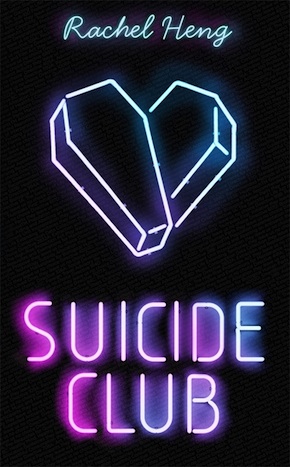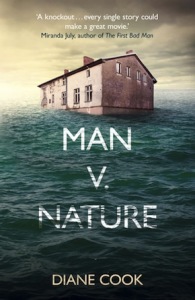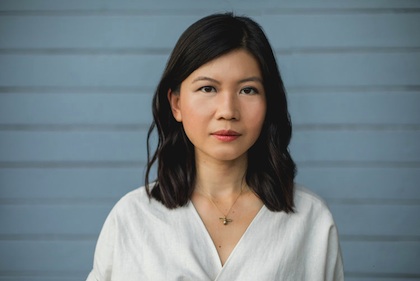Rachel Heng: Forever people
by Mark Reynolds
“An original and subversive exploration of health obsessions, consumptions, and what makes life worth living.” Independent
Rachel Heng’s remarkable debut novel Suicide Club imagines a disturbing not-so-distant New York in which death is put on hold for those with wealth and power and the determination to cling on, while the majority are left gawping at the gates of immortality. Lea is a 100-year-old ‘lifer’ with a high-powered job, whose trust in the extreme wellness regime is shaken when she crosses paths with her estranged father and the less fortunate Anja, a musician whose mother is on the verge of death after a series of illicit life-extending operations. So how would society shape up if there was a real chance – for some – to live forever?
MR: You imagine a world in which a wealthy, genetically fortunate elite have a life expectancy of around 300, thanks to advances in medical technology. But how much that is human is left towards the end of that lifespan? Anja’s mother, for example, is in a grotesque state of prolonged end-of-life care, “her body clicking and whirring long after her soul was gone.”
RH: Anja’s mother is not meant to be the norm. Her situation is something that’s gone wrong, because she started getting extensions on the black market and she’s ‘misaligned’. In the book I don’t specify how many people end up misaligned, and I wanted to leave that open, just to say there is that darker side that can happen. But this is also a valid question to ask about the people who don’t become misaligned. So for example Lea’s mother, who did everything right, is living this regimented life that’s more focused on maintaining and optimising the quantity rather than the quality of life. So I think in both situations not much is left that is human.
And it’s gearing towards the prospect of immortality as well, which is scarier still.
Yes, exactly. A terrifying concept.
What led you to create this world that judges people by their “lifespan-net-worth-index quota”, in which the “deliberate inducement of cortisol generation” is a crime, where the well-heeled can “pass their days indulging in languid self-maintenance” and “the chemical rush of well-being”?
I was thinking about this urge to live forever, to use technology to extend our lives, but also about who actually has that ability. And if it is something that works, what implications it has for society, widening the inequality.”
I think that world already exists, so I don’t know that I created it so much as I took the things I see around me to an extreme. Quite a few things inspired this book, but one of the things that did go into it was a piece I saw in The New Yorker about the Silicon Valley billionaires who are ‘hacking’ death; and how Google has this healthcare arm that’s trying to ‘solve’ death using data. There’s this notion that if you have money, power and access to information and technology, then you can overcome the last question that human beings haven’t been able to solve, which is our own mortality. I guess it’s the one thing that people continue to be obsessed by. And here are people who have the means and also the arrogance to say, “I’m going to solve this problem; I’m not going to die.”
So I was thinking about this urge to live forever, to use technology to extend our lives, but also about who actually has that ability. And if it is something that works, what implications it has for society, because only certain people will be able to do it, widening the inequality that we already see today in life expectancy between different socio-economic classes.
The setting is a futuristic New York. But how much of Singapore’s conformist and paternalistic society also informs the novel’s themes?
Did you see my Straits Times interview…?
… Exactly.
It’s funny, until I did that interview I hadn’t thought of it, but Singapore’s a small country that’s very young and faces a lot of natural challenges and has struggled to succeed. There is this approach towards optimising the resources you have, so a lot of things have been put in place that were seen as exigent. So the people who do better in school then get better jobs – not just naturally, but also through being awarded scholarships. It’s also a very metric-driven society, you go through exams from pretty much age seven, and you’re constantly streamed or filtered into different classes or schools.
When I read Plato’s Republic, I was shocked at how similar it was. He talks about the gold, silver, bronze and iron classes and the philosopher-kings who rule everything through wisdom and reason, and I think Singapore’s a society that’s very much divided along those lines, and this idea that certain people’s innate abilities qualify them for certain things. I grew up in that context, and so a lot of that is unconscious and affects the way I think about the world, but also it’s something that I guess I feel the pressures of, and I see the darker side to. So I do think that comes out in the book, the sense of this metric-driven society where people have to hit certain targets, and then you are rewarded based on what you do and what you don’t do.
When you went to study in New York, were you hit by an even more extreme culture of health and fitness and body consciousness?
I think those drives are pretty global. Maybe in America it’s taken a bit further, but when I wrote this book I had been out of the US for four or five years. I’ve been in London mostly, and I definitely saw it in the UK as well: the whole ‘clean eating’ movement and ‘Facepiration’ and all that kind of stuff on Instagram and Pinterest. So I think it’s been a global trend, but maybe in the US they take it a bit further.
The Suicide Club itself has its roots in a kind of subversive, alternative living, but an element is radicalised because it’s a brutal regime for ‘non-lifers’ and the system leaves them little choice. But you don’t focus so much on this underclass, which is for the most part an external threat. Was that a conscious decision?
I did think about which perspective to tell the story from, and what I wanted to show was someone who was very much in the system, and who had all the benefits but also all of the pressures, and how she slowly realises that none of this really is what she wants. The insularity of her world was the perspective I chose to tell the story from in the beginning. I think for the non-lifers, their lives remain more or less the same as the lives we know today, so I wanted to start from that privileged position to heighten the contrast.
If I were in Lea’s world, I would definitely not get to be a lifer. I’m not sure I’d be in the Suicide Club either, I’d just be on the margins, and sidelined by both.”
Suicide Club started as a kind of a joke label for people who still wanted to get together to enjoy eating meat and having a drink…
Yes, it started in this ironic vein, where they were saying, OK, we’re not doing what we need to do to live forever, so is the opposite of immortality suicide? But then it became this more extremist element that started committing actual suicides as a political point.
So how much of a health and wellness fiend are you personally?
Not very. I never really ate vegetables until I went to America, and I had my first ever salad when I was 19. But since then I started varying my diet a bit more. I guess in recent years I’m more conscious about trying to stay healthy and not fall sick. I try to exercise every week. But if I were in Lea’s world, I would definitely not get to be a lifer. I’m not sure I’d be in the Suicide Club either, I’d just be on the margins, and sidelined by both.
The memorably gruesome school rabbit scene was published as a standalone short story in The Offing. Did this begin as a character study for Lea, or was it always integral to the novel?
I wrote it pretty early on. I was on the Faber Academy course, and I wanted to explore how Lea got to be the way she is. Because if you see her just in the present day, she can be pretty inaccessible, since she’s maintaining such a facade. It’s easier for the reader to access her darker nature with that glimpse into her childhood, so it became pretty important to the novel.
Did you consider including a storyline about how people might extend the lives of their pets in this medically advanced world?
No I didn’t, but now that you mention it perhaps I should have! Though in this regime maybe they wouldn’t have pets. There’s a moment when Lea is talking to her father about dogs, and there’s a list of the dogs that are life-extending, that are good for you, and there’s a list of dogs that are cortisol-degenerating. So certain dogs are sanctioned, certain dogs are not. But the more I think of it, not many people would have pets, because it’s a world devoid of joy and spontaneity.
 The book straddles SF and literary fiction. Which books and writers have most influenced your writing to date?
The book straddles SF and literary fiction. Which books and writers have most influenced your writing to date?
I write short fiction as well, and I tend to write either realist or something like this, a bit more speculative, so I have influences from both sides. I have always loved Margaret Atwood, and I really like George Saunders. Another writer whose work I only discovered in recent years but who has affected the way I think about speculative fiction is Diane Cook. She released a collection called Man v Nature in 2014, which is a beautiful book in the speculative vein, but a bit more absurd and less grounded. She does really interesting things with the way she builds worlds in this very light-touch manner, but she tells you everything you need to know. The stories are short, but really immersive. I also like David Mitchell, who does that kind of blending of Sci Fi and literary as well. And then I guess on the realist side, I like emotional writing where you really feel for the characters, so I love Michael Cunningham – Flesh and Blood is one of my favourite books – and I love Chimamanda Adichie’s Americanah, that was a book that really impacted me with its strong female characters. In terms of older writers, I did a lot of nineteenth-and twentieth-century European stuff in undergrad and I’ve always loved D.H. Lawrence – I know he’s not very fashionable these days – and people like Dostoevsky, Tolstoy, Balzac, Zola. I like a good story, those sweeping narratives with a lot of emotional depth.
You’re part-way through an MFA at Michener. What have your been writing since finishing Suicide Club?
A lot of short stories. The reason I wanted to do an MFA was to improve my writing and to push the boundaries a bit more. I wanted that sort of external input, and to see what else I could do, and I think that’s better done in short form than to try and write a whole different novel. So I’ve been doing a lot of stories in the last few months. I have an idea for a second book, and I started writing it but then stopped because I think I don’t have the right angle yet. I don’t want to start something in a voice I’m not passionate about, so I’m going to leave it for a bit and maybe come back at it from a different angle. Or maybe I’ll just go on to a different project.

Author portrait © Andrew Bennett
Rachel Heng is a Singaporean writer who graduated from Columbia University with a BA in Comparative Literature Society. After working in the finance sector in London for several years, she moved to Austin, Texas, to pursue an MFA in Fiction and Screenwriting at the Michener Center for Writers, where she is a James A. Michener Fellow. Rachel’s short fiction has received a Pushcart Prize Special Mention, Prairie Schooner‘s Jane Geske Award, and has been featured by the Huffington Post as well as literary journals including The Offing, Prairie Schooner, The Adroit Journal and The Minnesota Review. Suicide Club, her debut novel, is published by Sceptre in hardback and eBook.
Read more
rachelhengqp.com
@rachelhengqp

